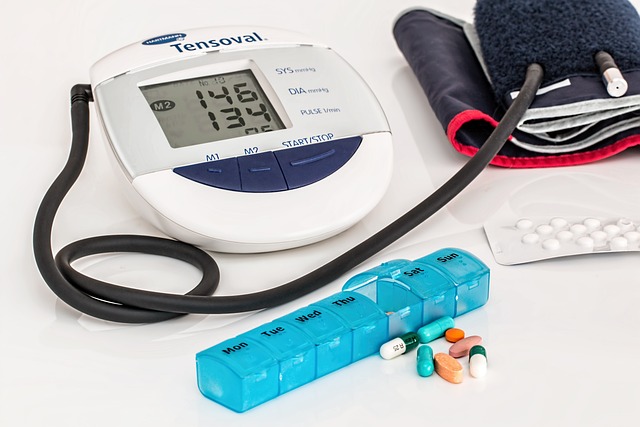Regenerative medicine for inflammation presents a revolutionary approach in managing joint and tissue damage caused by conditions like arthritis or injuries. By utilizing the body's natural healing mechanisms, including stem cell therapy, platelet-rich plasma (PRP), and advanced biostimulation, this field aims to reduce chronic inflammation, promote healing, and restore normal tissue function. Traditional methods often fail to address the root causes of inflammation, but regenerative medicine offers a more holistic path to recovery with lasting benefits, reducing reliance on medication or invasive procedures. Future advancements in stem cell therapies, biomaterials, and 3D printing promise even more effective treatments for conditions like arthritis and tendinitis.
“Inflammation, a protective response meant to heal, can turn into a chronic, debilitating condition affecting millions. Understanding joint and tissue inflammation’s intricate web of causes and effects is paramount in modern medicine. This article delves into the profound impact of this condition, exploring the transformative potential of regenerative medicine for inflammation. From conventional therapies to cutting-edge techniques, we dissect advanced solutions, including innovative regenerative approaches, promising a new era in managing chronic inflammatory conditions.”
- Understanding Joint and Tissue Inflammation: Causes and Impact
- The Role of Regenerative Medicine in Treating Inflammatory Conditions
- Advanced Techniques and Therapies for Effective Inflammation Management
- Future Prospects: Innovations in Regenerative Solutions for Chronic Inflammation
Understanding Joint and Tissue Inflammation: Causes and Impact

Joint and tissue inflammation, often a sign of underlying conditions like arthritis or injuries, can significantly impact mobility and quality of life. Understanding its causes and effects is crucial for developing effective treatments, which is where regenerative medicine for inflammation steps in as a promising approach. This complex process involves the body’s immune system responding to damage or infection, leading to redness, swelling, pain, and warmth in the affected area. Over time, chronic inflammation can cause joint degradation, tissue scarring, and even organ dysfunction.
Regenerative medicine offers innovative solutions by harnessing the body’s natural healing mechanisms. It focuses on restoring normal tissue function instead of simply managing symptoms. This field incorporates various techniques like stem cell therapy, platelet-rich plasma (PRP), and advanced biostimulation methods to stimulate the growth of new, healthy cells and tissues, potentially reducing inflammation and promoting healing.
The Role of Regenerative Medicine in Treating Inflammatory Conditions

Regenerative medicine represents a groundbreaking approach in treating joint and tissue inflammation, offering promising solutions where traditional methods often fall short. This innovative field harnesses the body’s inherent healing capabilities by stimulating the growth of new, healthy cells and tissues, effectively replacing damaged or diseased areas. With its ability to regenerate, regenerative medicine provides a sustainable and long-lasting treatment for inflammatory conditions, reducing reliance on persistent medication or invasive procedures.
The key lies in utilizing specialized cells, such as stem cells, which have the remarkable capacity to differentiate into various types of cells needed for tissue repair. This precise targeting of damaged joints and tissues ensures minimal side effects and promotes natural healing processes. As regenerative medicine continues to evolve, it holds immense potential in revolutionizing the management of inflammatory conditions, offering patients a more holistic and effective path to recovery.
Advanced Techniques and Therapies for Effective Inflammation Management

Advanced Techniques and Therapies for Effective Inflammation Management
In the realm of managing joint and tissue inflammation, modern medicine has embraced innovative solutions that go beyond traditional treatments. One such game-changer is regenerative medicine for inflammation, which leverages the body’s natural healing mechanisms to restore damaged tissues and suppress inflammatory responses. This cutting-edge approach involves using autologous cells, growth factors, and biocompatible scaffolds to create a tailored environment conducive to tissue regeneration.
Among these advanced techniques, platelet-rich plasma (PRP) therapy has gained significant traction. PRP is enriched with growth factors derived from the patient’s own blood, making it a safe and effective option for reducing inflammation and promoting healing. Additionally, stem cell therapies offer immense potential by differentiating into various cell types required for tissue repair. These advanced therapies not only provide relief from symptoms but also aim to address the root cause of inflammation, ensuring long-term benefits for patients suffering from chronic joint and tissue conditions.
Future Prospects: Innovations in Regenerative Solutions for Chronic Inflammation

The future of managing chronic joint and tissue inflammation lies in the innovative applications of regenerative medicine. This burgeoning field offers promising solutions by harnessing the body’s inherent healing abilities, targeting not just symptoms but also the underlying causes. With advancements in stem cell therapies, biomaterials, and 3D printing, researchers are developing custom-made scaffolds to facilitate tissue regeneration, potentially transforming treatments for conditions like arthritis and tendinitis.
Regenerative solutions have the potential to revolutionize care by providing more durable and natural remedies compared to traditional anti-inflammatory drugs. Ongoing research explores the use of platelet-rich plasma (PRP) and mesenchymal stem cells (MSCs) to modulate inflammation, promote tissue repair, and reduce pain in affected joints. These approaches aim to create personalized treatments, offering a promising glimpse into a future where chronic inflammation can be effectively managed without the long-term side effects often associated with conventional medications.
In conclusion, advanced solutions for joint and tissue inflammation are reshaping the landscape of medical treatment. The integration of regenerative medicine for inflammation offers promising avenues for managing chronic conditions. As research continues to unveil the intricacies of inflammatory processes, innovative techniques and therapies will undoubtedly enhance our ability to provide effective care, improving the lives of those affected by these complex conditions.
